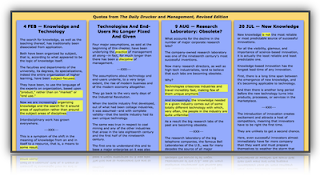As seen on 60 minutes website
November 11, 2012 7:08 PM
Klaus Kleinfeld, CEO of aluminum company Alcoa, tells Byron Pitts that workers need a combination of education and skills that are in demand by employers.
Byron Pitts, CBS
My impression is that employers talk about education
Byron Pitts, CBS
Employees talk about income and salaries
Klaus Kleinfeld, Alcoa CEO
Yes, but they also need to understand that their incomes over time are a direct function of education. Not just their education but of their skills.
Of what they can bring to the table.
Klaus Kleinfeld, Alcoa CEO
The societal model of the past was that you were born, you were nurtured up to whatever you were 6, you went to kindergarten and school and by eighteen you come out and you go to college. When you come out of college you get a job and then you retire at age 65 and then enjoy your retirement in some hot place. Right. That's been the model of the past.
Klaus Kleinfeld, Alcoa CEO
That's not working. That's absolutely not working anymore. In every respect.
Byron Pitts, CBS
Not working or just dead?
Klaus Kleinfeld, Alcoa CEO
It's dead. I would say it's dead for every level. For every level in society. I mean everyone. Everyone.
The kids and grandkids in your family are going to grow up and older in the world ahead — 2020, 2030 ... Yet their expectations are probably based on the dead model. And the education system is still glued to the past — regardless of how much it costs.
rlaexp.com is specifically designed to provide a work approach that deals with the new challenge we all face.
If you Google the core concepts on the page above, almost all the Google search results lead only back to rlaexp.com. The uniqueness is the collection of concepts and their cross-linking all on one site.
This page above is just one of over 500 pages.
There is more world view content here than maybe Harvard's catalog. You know there is lots of stuff on Amazon that is not taught at Harvard.
The site contains a number of copyrighted concepts that I've had to work out for getting from concepts to daily action along three time-lines:
- The changing social and economic picture
- Organization evolution (from birth to death)
- Career evolution in a world where life-time employment is dead
In dealing with the challenges of navigating our own way through time we need "foundationS for future directed decisionS" ©
There is nobody better than Peter Drucker to help us create our own. Some jumping off points:
Take a tour?























